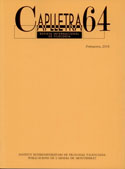Abstract nouns as metadiscursive shells in academic discourse
DOI:
https://doi.org/10.7203/caplletra.64.11372Keywords:
metadiscursive nouns, shell nouns, cohesion, persuasion, academic discourse Abstract
Abstract
Academic discourse is characterized by an abundance of abstract nouns such as analysis, research, process, concept, approach or role. These nouns are considered cohesive devices since their full content is determined by referring to their context and they have received numerous denominations (anaphoric, signaling, carrier, shell or metadiscursive nouns). This paper explores the metadiscursive role of shell nouns in a corpus of academic abstracts written by university students for their Senior Theses, based on Schmid’s (2000) and Jiang and Hyland’s (2016, 2017) proposals. The rhetorical, persuasive potential of these abstract nouns in this type of academic discourse is also addressed. The results show that advanced EFL writers deploy a wide range of abstract nouns in patterns that resemble those of scholars (Jiang & Hyland 2017). Different moves in the text seem to influence the type of noun employed. All in all, advanced English Studies majors are aware of academic disciplinary conventions but would benefit from training in abstract writing, particularly in the distribution of the text’s moves.
 Downloads
Downloads
Downloads
Published
How to Cite
-
Abstract832
-
PDF622
Issue
Section
License
Authors submitting work to Caplletra for publication must be the legitimate holder of the usage rights. Legitimacy for the purposes of publishing the work must also include images, tables, diagrams and any other materials that may complement the text, whether they are the author of such material or not.
Copyright: on publishing their work in the journal, the author grants Caplletra. Revista Internacional de Filologia usage rights (reproduction, distribution and public communication) for both the paper printed version and for the electronic version.
All work published in Caplletra is covered by the Creative Commons license type Attribution-NonCommercial-NoDerivatives 4.0 (CC BY-NC-ND 4.0).
RESPONSABILITY
Caplletra. Revista Internacional de Filologia does not necessarily identify with the points of view expressed in the papers it publishes.
Caplletra. Revista Internacional de Filologia accepts no responsibility whatsoever for any eventual infringement of intellectual property rights on the part of authors.






